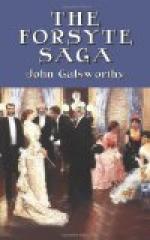“Incredible!”
She had spoken without raising her eyes, but she looked up now. Those dark eyes clinging to his said as no words could have: ’I have come to an end; if you want me, here I am.’
For sheer emotional intensity had he ever—old as he was—passed through such a moment?
The words: ‘Irene, I adore you!’ almost escaped him. Then, with a clearness of which he would not have believed mental vision capable, he saw Jolly lying with a white face turned to a white wall.
“My boy is very ill out there,” he said quietly.
Irene slipped her arm through his.
“Let’s walk on; I understand.”
No miserable explanation to attempt! She had understood! And they walked on among the bracken, knee-high already, between the rabbit-holes and the oak-trees, talking of Jolly. He left her two hours later at the Richmond Hill Gate, and turned towards home.
‘She knows of my feeling for her, then,’ he thought. Of course! One could not keep knowledge of that from such a woman!
CHAPTER IV
OVER THE RIVER
Jolly was tired to death of dreams. They had left him now too wan and weak to dream again; left him to lie torpid, faintly remembering far-off things; just able to turn his eyes and gaze through the window near his cot at the trickle of river running by in the sands, at the straggling milk-bush of the Karoo beyond. He knew what the Karoo was now, even if he had not seen a Boer roll over like a rabbit, or heard the whine of flying bullets. This pestilence had sneaked on him before he had smelled powder. A thirsty day and a rash drink, or perhaps a tainted fruit—who knew? Not he, who had not even strength left to grudge the evil thing its victory—just enough to know that there were many lying here with him, that he was sore with frenzied dreaming; just enough to watch that thread of river and be able to remember faintly those far-away things....
The sun was nearly down. It would be cooler soon. He would have liked to know the time—to feel his old watch, so butter-smooth, to hear the repeater strike. It would have been friendly, home-like. He had not even strength to remember that the old watch was last wound the day he began to lie here. The pulse of his brain beat so feebly that faces which came and went, nurse’s, doctor’s, orderly’s, were indistinguishable, just one indifferent face; and the words spoken about him meant all the same thing, and that almost nothing. Those things he used to do, though far and faint, were more distinct—walking past the foot of the old steps at Harrow ’bill’—’Here, sir! Here, sir!’—wrapping boots in the Westminster Gazette, greenish paper, shining boots—grandfather coming from somewhere dark—a smell of earth—the mushroom house! Robin Hill! Burying poor old Balthasar in the leaves! Dad! Home....




